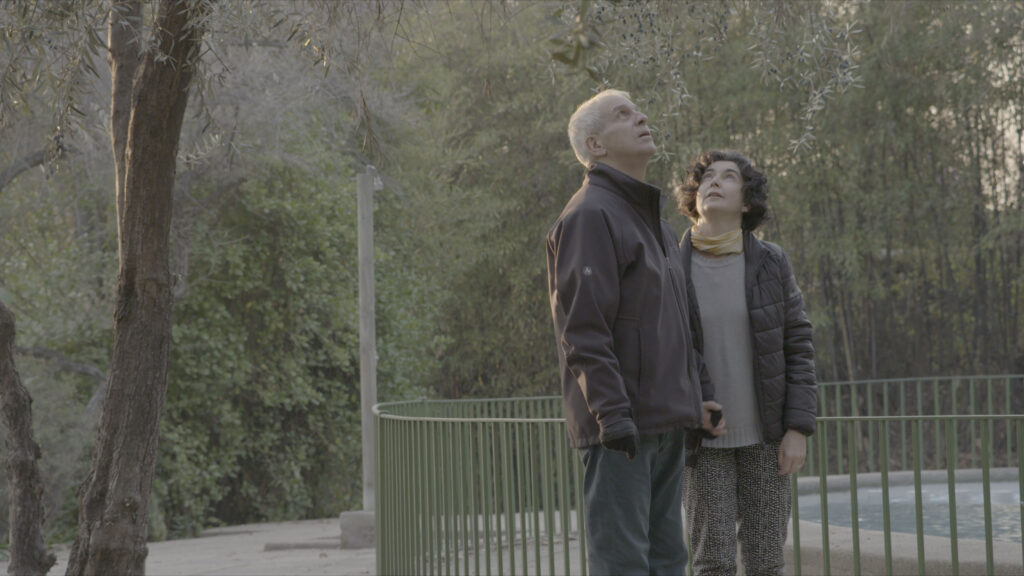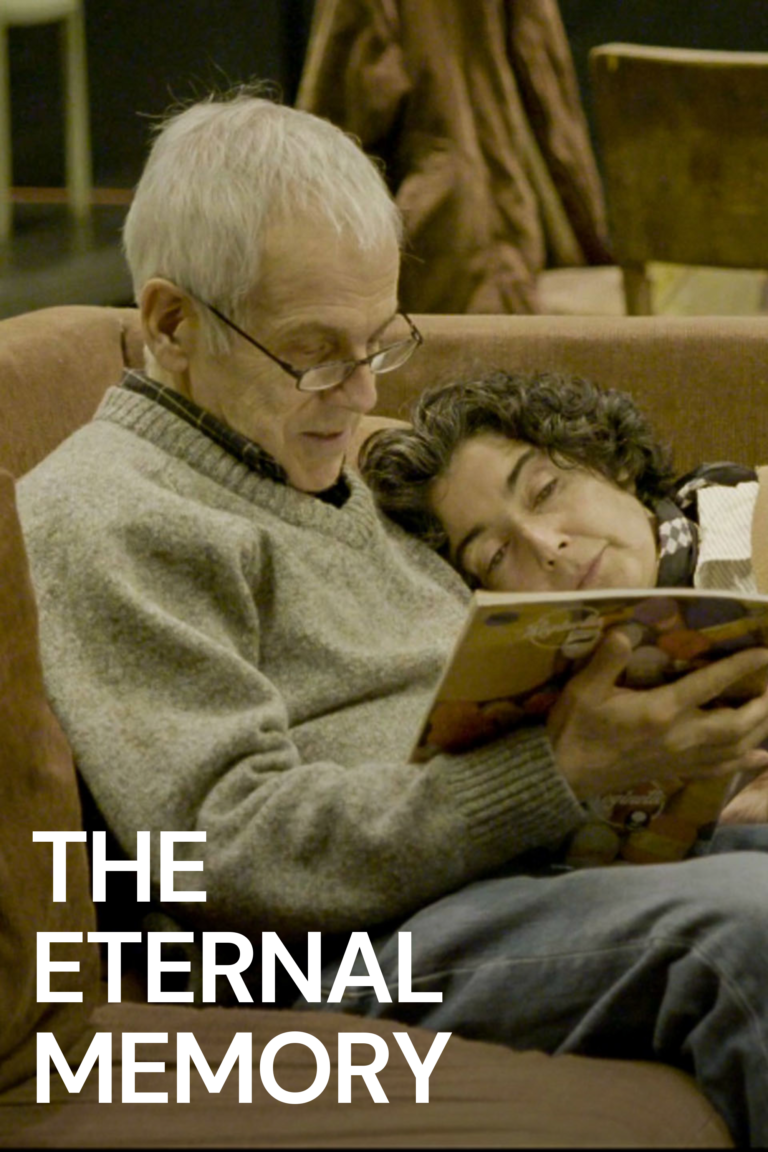The Eternal Memory – Snapshot
The Eternal Memory successfully captures the loving relationship between a wife trying to give care to her Alzheimer’s-afflicted husband. It also tries, unsuccessfully, to paint a parallel picture with his work as a reporter in Chile during the Pinochet regime! (3.5*)
Where to Watch:
Stream:Paramount+
Rent: Prime/Apple/Fandango ($4)
The Eternal Memory – The Oscar Buzz
Oscar Nominations (1) / Oscar Wins (0) :
Documentary Feature
The Eternal Memory continues our string of foreign-born documentaries. This time, the movie is from Chile. It was the brain-child of director and writer Maite Alberdi. This was Alberdi’s second trip to the Oscars, the first was for her 2020 documentary, The Mole Agent, which I reviewed 3 years ago. She brought several members of that movie team over to work on this one. While that film also dealt with the elderly and had some interesting features, I objected to the artifice of implanting “the mole” and found “there is an ethical question of filming the lives of these elderly people under false pretenses – that should make the filmmakers at least a little bit nervous.” Fortunately, there are no such artificial constructs in The Eternal Memory and Alberdi does a great job of minimizing their intrusion into the couple’s lives even to the point of letting them manage the camera during the peak Covid years. The team which initially started working in films during the 90s, is reaching a stage of success symbolized by the invitation to Alberdi to join the Academy in 2018. As we have seen this year, interesting documentaries are being made around the world.
The Eternal Memory – Related Movies
The Mole Agent: (Direction, Screenplay, Cinematography, Film Editing)
The Grown-Ups (16) (Direction, Writing, Score, Cinematography)
I’m Not From Here (16) (Direction, Writing, Cinematography)
The Eternal Memory – What Others Think
Like our last two documentaries, To Kill a Tiger and Four Daughters, The Eternal Memory has not had a huge release history. Viewer rankings are limited to barely 3500 ratings. Viewers found it comparable to To Kill A Tiger and behind 20 Days in Mariupol in the documentary category and ninth (out of 38 of this year’s movies) and tied with Perfect Days and Anatomy of a Fall. Viewers wrote that it was “Touching and Beautiful to Observe” and had the subject “Of Love, Memory, and Identity”.
Our critical rankings put the film right in the middle of the documentary pack and fourteenth out of all movies, tied with the Mission Impossible movie and Robot Dreams. Glenn Kenny (RogerEbert) raises the ethical question “Some moments are painful to watch. And they make one wonder, again, about whether one ought to be watching them at all.” But the main point of the movie is “We are left with the question of what a person can hang on to when everything about their identity and values leaves them.” Ben Kenigsberg (New York Times) was impressed with the couple’s relationship and asks “Could any film completely capture such a private dynamic? …The Eternal Memory appears to come close.”
Overall the film ranks 11th out of all 38 films, tied with American Fiction, Perfect Days, and Killers of the Flower Moon.
The Eternal Memory – Special Mention
Alzheimer’s – Just like the other documentaries we have covered so far, you could write a book, or several, discussing the clinical aspects of the movie’s main subject – in this case, Alzheimer’s disease. As The Eternal Memory makes clear, Alzheimer’s is a progressive disease which makes it all the more insidious. Caregivers, usually family members at home, at first don’t have any real problems, but as the victim deteriorates, care becomes more and more difficult and stressful for the caregiver, as well as the patient. Life expectancy, after diagnosis is 3-12 years – a long time for everyone involved. As of today, there are no treatments that stop or reverse symptoms.
Alzheimer’s afflicts an estimated 50 million people worldwide with an annual economic cost of $1 Trillion! 6% of those over 65 have the disease, with the percentage rising with age. Women are more likely to get it than men – although I wonder if that is because men typically die off earlier than women. Risk factors include genetics, head injuries, clinical depression, hypertension, psychological stress, and lack of physical and mental exercise.
The Eternal Memory – Michael’s Moments
The Eternal Memory tries to accomplish two things and it succeeds at one of them but doesn’t do well at the other.
The filmmaker Maite Alberdi has an apparent fascination with aging and the plight of elderly people. Her first trip to the Oscars, with The Mole Agent was a film where she tried to capture possible theft and abuse against a particular family matriarch in an assisted living home for the elderly. She did that by sending an old gentleman actor to play the “mole” acting as a regular patient. She then sent in a film crew, supposedly, to film a documentary about the elderly, but actually there to follow the mole’s efforts to uncover signs and sources of abuse. The film raised serious ethical questions because the residents of the home received incorrect information about the purpose of the film crew and, therefore, didn’t give informed consent to be filmed.
In The Eternal Memory we don’t appear to have that problem. The camera records some very precious and painful moments in the life of a couple where the man suffers from increasingly severe Alzheimer’s and becomes overly dependent on his 17-year younger wife. The filming appears to start while Augusto is still reasonably coherent and he appears to agree to the idea of a documentary about his final few years. (There is, of course, a very good question about whether he was even aware that he was being filmed in some of the later scenes and whether, if he had been aware that the camera was on, he would have continued his consent. But I think at that point, his decisions were being made for him by his wife, so we have to assume that she gave it for him.)
So Alberdi has keen interests in the problems of the elderly and we can only hope that she continues to explore the subject since many of us end up living that stage of life . The strongest points of The Eternal Memory are in showing how Alzheimer’s is such an insipid disease, giving moments of tender clarity, only to be offset by angry frustration at not even knowing your own reflection in a mirror. And she goes beyond that by showing us not just the effects on the victim but the impact on his caregiver.
It is also beautifully obvious how much his wife, Paulina, loves him. We see tender moments of affection even as Augusto is literally losing his mind, indicating that deep down in his brain he must have some strong connection with this stranger. The film opens with a scene in their bedroom where he awakens and she speaks to him, but he has no idea who she is or where he is. And yet he is perfectly calm and content suggesting that, somewhere in the back of his faltering brain, there is some kind of recognition, something that says he can trust this person. There are multiple scenes like that as well as archival clips of home movies from their lives before Alzheimer’s was the dominant fact in their world.
The film also shows, painfully, how much the caregiver must sacrifice. Most Alzheimer’s victims are treated by family members, usually the spouse. And while we most often think of the victim’s plight, the suffering of the caregiver is probably just as great. How can it feel when your partner of two decades no longer knows who you are? How easy can it be to watch him try to converse with his reflection as if it were another person in the room? And physically caring for someone who can no longer provide even basic hygiene is obviously exhausting and frustrating. Most of us thought we left those years behind when our children left their cribs.
These feelings and the impact of Alzheimer’s is where The Eternal Memory succeeds. But Alberdi apparently had a grander film in mind and that’s unfortunate. She attempts to tie the loss of personal memory to the attempts in dictatorial regimes of eliminating cultural memory in order to further political goals. While it is an interesting concept, it doesn’t achieve liftoff in The Eternal Memory. Augusto, it turns out, was a network television reporter in Chile during the Pinochet reign (1973-1990). He spent a great deal of his work life trying to capture and document – and instill in the Chilean cultural memory – what was happening under Pinochet. The film includes several clips of some of his reporting and, while the facial features are similar, his cognitive abilities now are a mere shadow of his former self.
Augusto, the reporter, wrote a book cataloging his reporting and providing a history that he felt was important to record. Towards the end of the book (I haven’t read it) he apparently writes “Without memory there is no identity”. The Eternal Memory is attempting to create a parallel between the loss of memory, and therefore, identity in a person, to the similar process in dictatorial regimes to reconstruct a national identity more in the image of the dictator’s beliefs. It is a huge, and intriguing idea, but it deserves its own full movie, at least. The fleeting references aren’t grounded enough to develop the notion and so it falls on flat feet.
The Eternal Memory is already one of this year’s shorter films, at 85 minutes. So possibly Alberdi wanted to add some material to conform to more normal movie lengths. But it feels tacked on and so it detracts from the more meaningful message of how heartbreaking Alzheimer’s can be for everyone involved. Watch the film for that, and ignore the national identity stuff. (3.5*)


